-
Posts
1,004 -
Joined
-
Last visited
Content Type
Profiles
Forums
Gallery
Events
Posts posted by flyer
-
-
Then I tried to make the seams by ‘pulling threads’.
First tries were encouraging but trying to do it in grander scale brought some problems forward: The progress was very slow and the thread kept snapping, making a whole sail useless. Then I saw that a lightly penciled seam looks practically the same way as a laboriously pulled thread.
The boltrope was first hand -sewn on. This looked too ugly. It was then glued into the hem according to the following very interesting link:
http://modelshipworldforum.com/resources/Rigging_and_Sails/ScaleSails.pdf
This provided so far the best result with a moderate amount of work.
The sail was shortened by about 30% to reduce its bulk when furled.
Pulling threads provides a fine result but...
A pencilled seam looks adequate with less work, producing no rejects
Finished sail on the drawing of the sail in full size
- dafi, Barbossa and Landlubber Mike
-
 3
3
-
First the finest cotton I could find in a drapery was lightly colored with a mixture of black and sage tea. Here I was following again the advice of Wolfram zu Mondfeld. The aim was to get a light brown-grey tone.
The sail maker inspects the original cotton, lying on top of a dyed part
This is the finest fabric I could find
- dafi, Barbossa and Mirabell61
-
 3
3
-
While working on the boats I also tried to figure out how to make Pegasus’ furled sails.
Earlier solutions included sails sewn by my mother (35 years ago, for Dolphyn), bought whole from the kit supplier (for La Gloire, ugh), sewn by a professional seamstress with self applied bolt ropes (on Granado, still much room for improvement) and all were not truly satisfying.
Sample sails: left side: one unused staysail from Pegasus, made by a seamstress, no bolt ropes yet
middle: glued sail with hand sewn bolt rope – sigh
right: glued hem with boltrope glued into the hem, seams are penciled on – the best
An example of a sail from the store, bought for La Gloire
-
Hi Michael
Strange. I was able to follow your beautiful, beautiful Vasa uninterrupted. Perhaps the connection was reestablished both ways by the fact that I eventually could stay again 2 days in LA after a long interval. Spending some time on the beach at Point Dume certainly connects me somehow to California – a truly nice place.

Take care
Peter
-
Hi Martin
Thank you very much.
 But sometimes I hate that skipper.
But sometimes I hate that skipper.Peter
-
Well, of course it went the way I dreaded, the way the skipper wanted. I had to remake the rear bench and that little deck in the bow of the longboat.
The details of the launch were completed and fortunately it fit into the reworked longboat without any additional supports.
Provisional stowing on the spare spars seems to show a piece of luck - that it should be possible to fix those two boats there just as they are.
Reworked longboat and detailed launch
Boats provisionally stowed
-
Hi Martin
Just found your log and must say that’s a very neat looking Snake you have here. The Mamoli kits are not too bad as they are but your improvements are really bringing your ship dangerously close to the dark arts of scratch building!
Keep up the good work
Peter
-
Hi Vitus
That great cabin will be the envy of the whole fleet (of Flies and Pegasuses). And I love that stove too. Those are great improvements.
If you allow a little but…
In my opinion the decoration on the bow sit’s on top of the whale (at least on my Pegasus). I would close the whale and put the decoration on top of it. I think this looks better.
Keep up the good work!
Cheers
Peter
-
Hi Mike
Those furled sails look really good!
Thank you for sharing your technique and your research.
One thought about that working order:
On my first model I started according Wolfram zu Mondfelds advice for masting and rigging: Start aft and low and work upwards and forward. So far it always went quite well that way and also on Pegasus the first installed yard will be the crossjack and the first furled sail the mizzen topsail.
The way you reduce your sails seems quite daring. I’m just asking myself if I should reduce a bit less. By keeping the original form and reducing it just by perhaps 30% (also an advice from aforesaid W. z. M) I hope to retain a certain bulk in the furled sail. You achieved quite slim forms. Perhaps those would be a bit too elegant for my working horse.
I hope you don’t mind what is in no way meant as criticism. I just like to share my thoughts with somebody who is as well working to achieve good looking, furled sails.
Keep up the good work!
Cheers
Peter
- Landlubber Mike and mobbsie
-
 2
2
-
The 19’ launch from CC was constructed similar to the longboat but with slight improvements.
It will be fitted out with oars etc. It looks a bit better than the longboat and there might an improvement of the later become necessary.
The captain inspects the new launch
Unfortunately the skipper seems to like it and the look in his eye tells me that he would like the longboat to be of the same standard. (In fact you see the bosun already calling the carpenters to work on that. I’m afraid they will be busy elsewhere and the work will end up on my table – as almost every time.)
-
Hi Andy
That is a great build you have here. And it must be fantastic to be able to combine hobby, profession and calling in such a way.
Merry Christmas and a happy new year!
Peter
-
Hi Mike
Thank you and all the best for you and your family as well!
Yes, there will be furled sails. I’m still in the experimenting phase but pulling the threads to simulate seams seems to work OK. Following your lead I will glue the seams as far as needed (I found glue which seems to work fine but of course there is always room for improvement). So far I intent to sew on those parts of the boltrope which are needed but there will also be some experiments with gluing.
By the way – your Badger is looking mighty fine!
Cheers
Peter
-
-
Hi B.E.
Thank you, for the compliments.
I rechecked your Pegasus and saw the difference you built into those rails and bumkins.
Sigh.
Well, while working on the sails, I will have ample time to consider a rebuild.
Did you bend the finished bumkins or work that form out of a bigger piece of wood?
Cheers
Peter
-
Hi ZyXuz
Thank You!
Hi Martin
Thank you. Yes, they seem a bit heavy. I will have time to consider a rebuild. That traveler really looks adequate for such a simple little addition. I ask myself why it isn’t provided with any kit.
Cheers
Peter
-
Hi Sailor123…
Thanks. No, the bosun was just checking the top and the respective sailor claimed to be working.
Well, I’m sure, you know them sailors…

Cheers
Peter
-
Finally the last part of the standing rigging was done.
The fore topmast presented no special problems, except that I find it strange that the flagstaff- or royal stay has to be set up with an spliced eye at either end, leaving no easy way to tighten or loosen it.?
The way to install the bumpkins presented a riddle again. I wanted to have them lying on the bow head rail (and still ask myself if I should fix them there with an iron band). After several tries I found the present position. They just seem to look a bit too much forward; the angle to the bowsprit being closer to 30° than the 40° I estimate on plans.
Now I’m fixing some loose ends (ships boats, gun port lids etc.) while I think about how to make perfect sails with practically no hard work required...
Fore topmast top
Making one of the bobstays
Jib boom tip
I hope the position of those bumpkins is adequate
- dafi, davyboy, Mirabell61 and 4 others
-
 7
7
-
Hi Mobbsie
Very nice progress. I feel a bit dizzy again from watching you moving with that speed.

Just a question about the ratlines: Wouldn’t you find it easier to dye them before installing? (I usually dye a meter or yard or so of the line at a time and make then the ratlines. That way I never have a drop of the stain staining my deck.)
Cheers
Peter
-
After a long break, work continued on the standing rigging of the foremast.
The last of the ratlines (for this project) were put in place on the fore topmast. Stays and backstays were put in according to the kit’s drawings.
A jib stay was added and put in according James Lees description ‘for smaller ships’. (No falls for the aft end of the stay and the outhauler – easier setup.)
The work continues under the watchful eye of the captain
Topmast stay tackle
Fore top
The block stropped to the starboard side of the fore topmast cap caries the jib stay
Traveller with jib stay and out hauler. The single block on the traveller is for the downhauler of the jib.
The standing rigging nears completion
-
Hi Andy
I’m sorry to hear about your loss. You sure know the saying that nobody is really dead as long as he lives in the memories of people close to him. And if one sees his time coming it certainly is easier to accept it, knowing that people like you will keep him alive.
Take care
Peter
-
Hi Mike
Your sails are looking nice. Nevertheless the promised answers to your questions: (I hope you don’t mind invading your blog with a few photos of Granado.)
1. My sails – especially the topsails - are still too bulky. Yours look better.
2. No. I think they would be covered by the furled sail anyway.
3. Yes, it must to work properly.
4. Yes, and they look much the same as yours.
My main sources are: ‘The masting and rigging of English ships of war’ by James Lees and
‘Seamanship in the age of sail’ by John Harland and Mark Myers
Cheers
Peter
- Landlubber Mike and JesseLee
-
 2
2
-
-
Hi Mobbsie
Thanks. Yes, this is the CC Granado. Somewhere I read that note about not having no boat at all as well and I cannot believe it. Would you go skydiving without a parachute? But that’s not the correct analogy – it’s not a lifeboat. But you would need it continuously for communication with the shore or to run all that little errands which come up all the time. If you put two boats on a vessel as tiny as Pickle you should allow at least a small one even when Granado is fitted out as bomb vessel.
Cheers
Peter
-



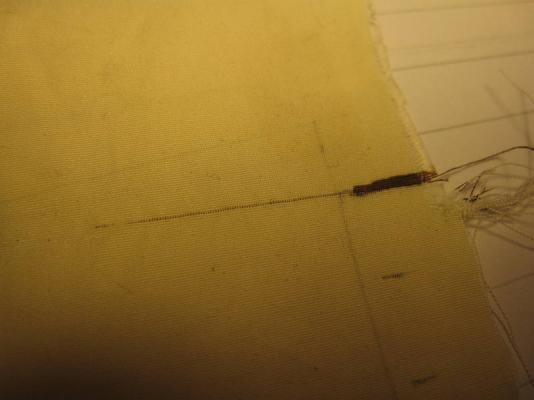
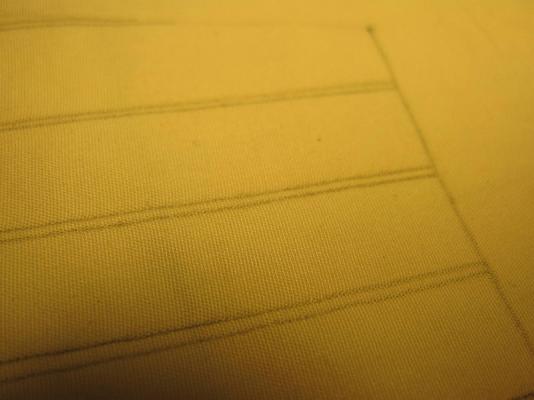
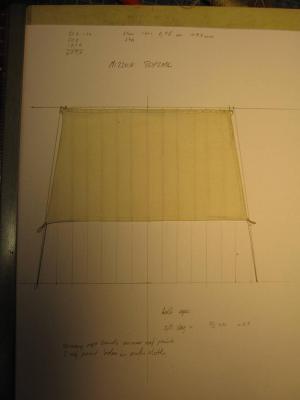
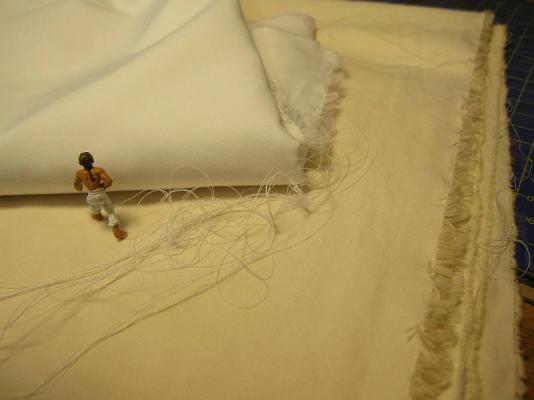
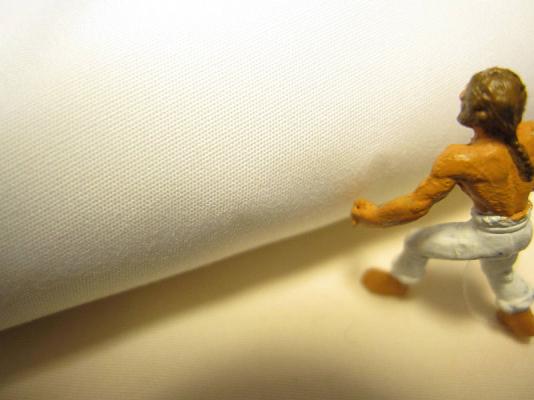
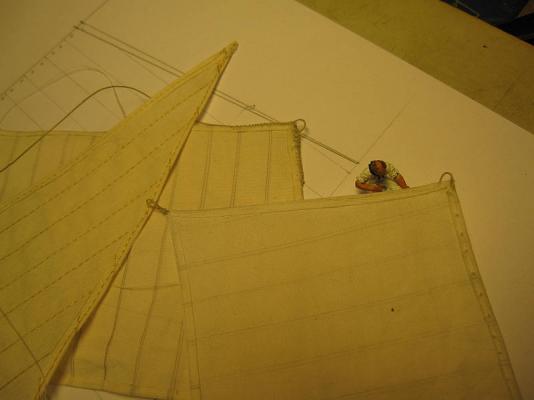
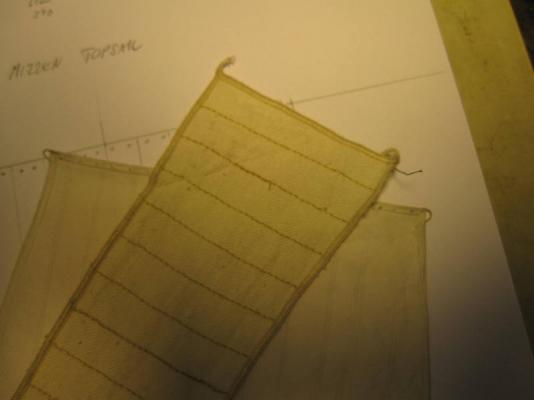
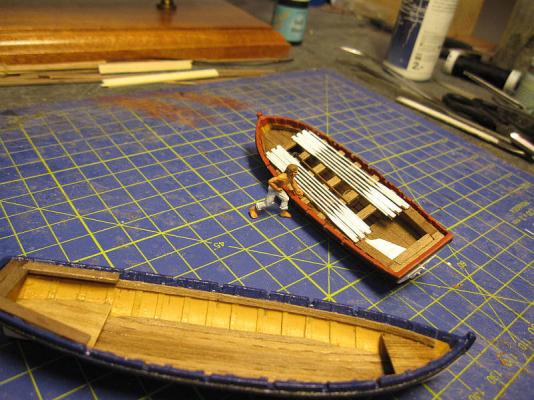
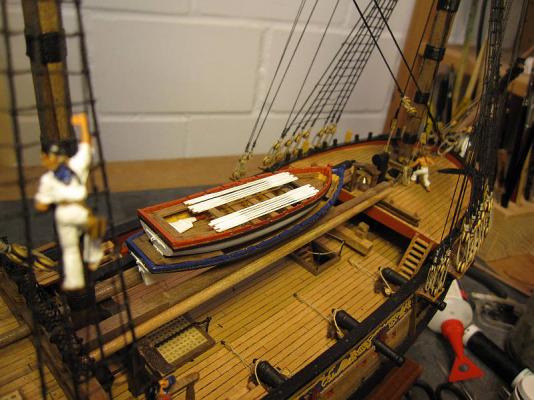
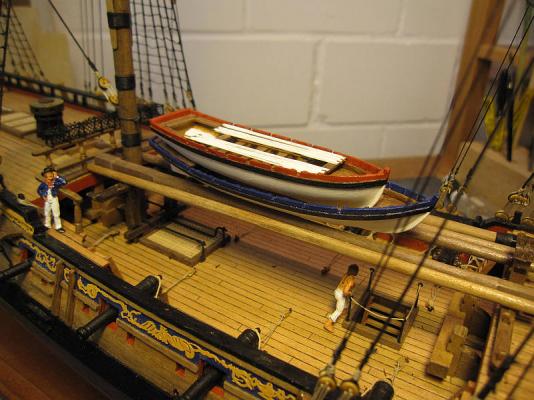
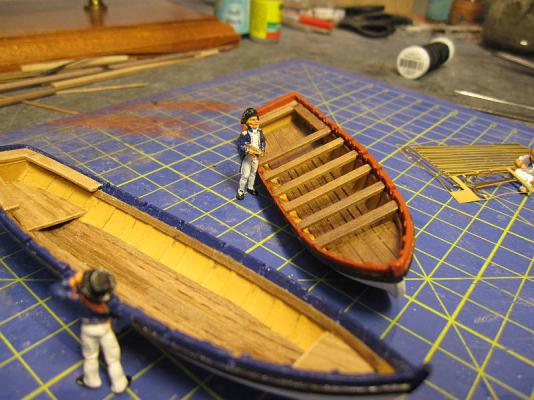
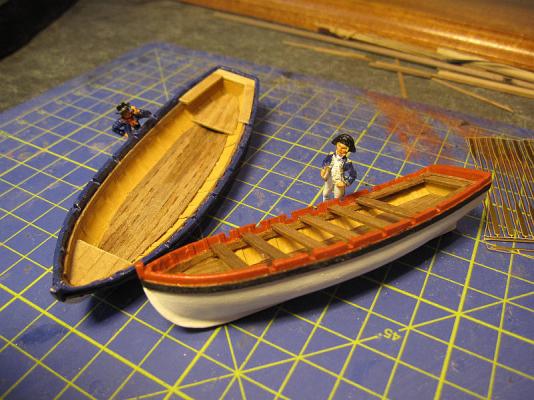
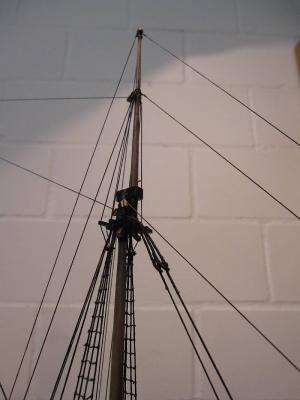
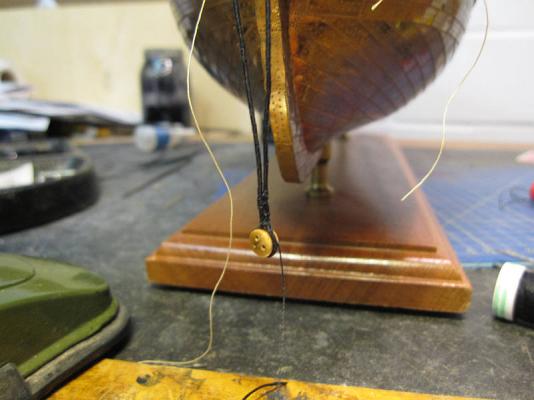
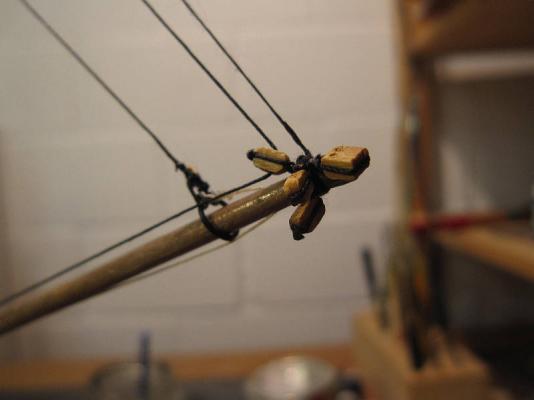
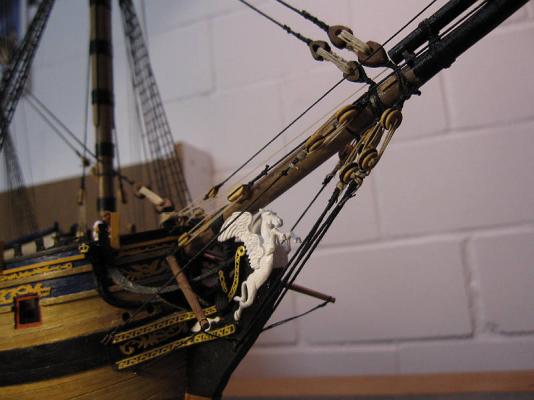
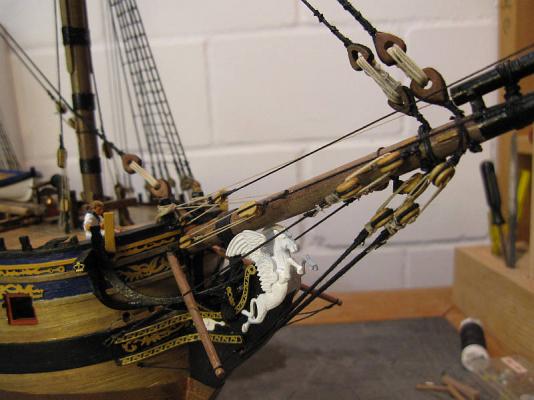
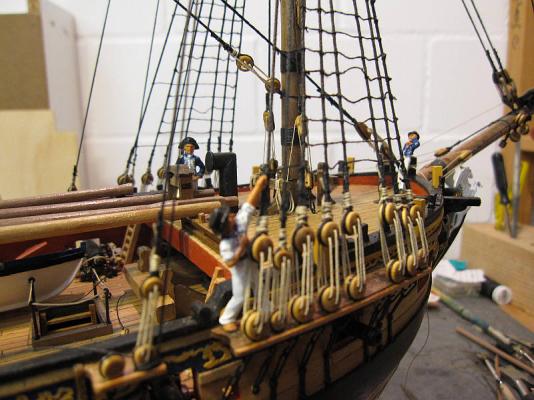
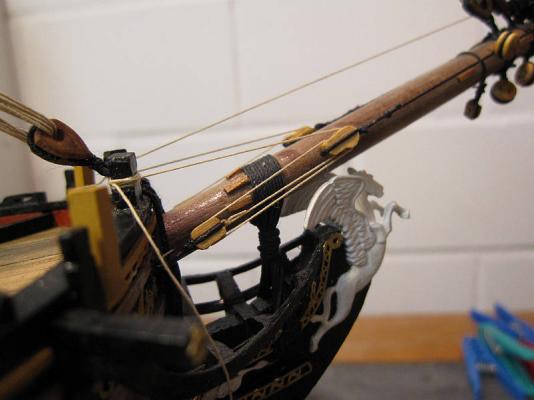
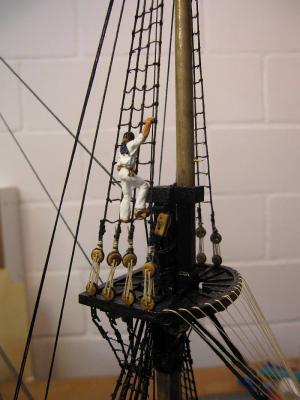
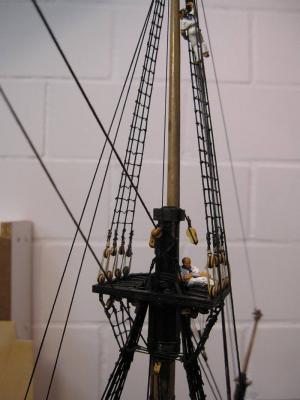
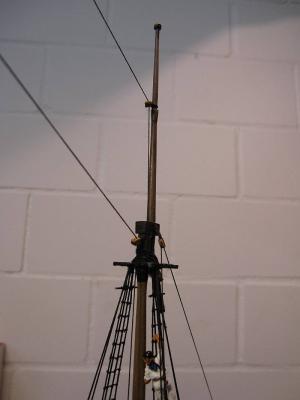
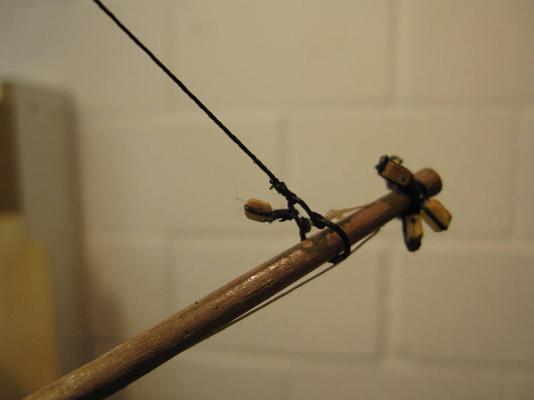
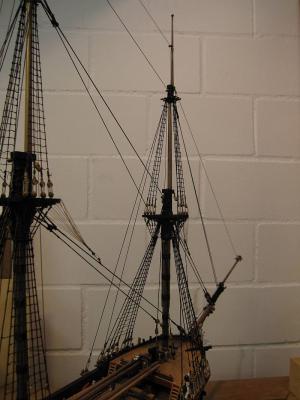
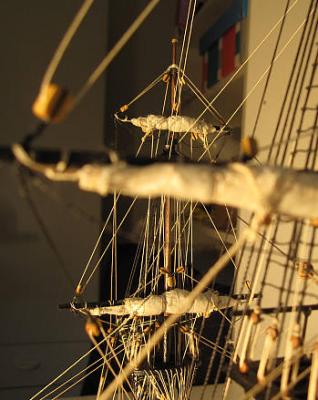
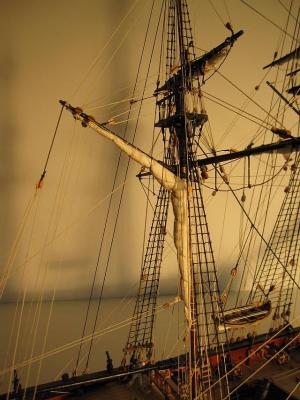
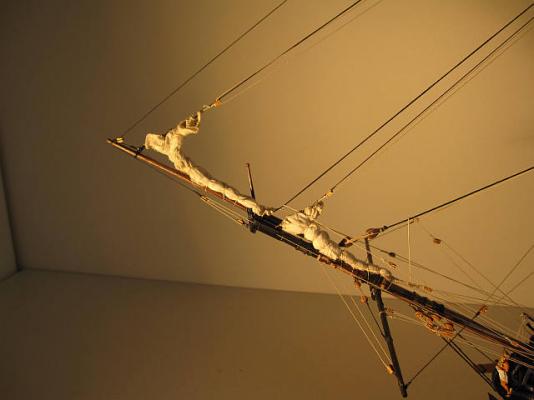
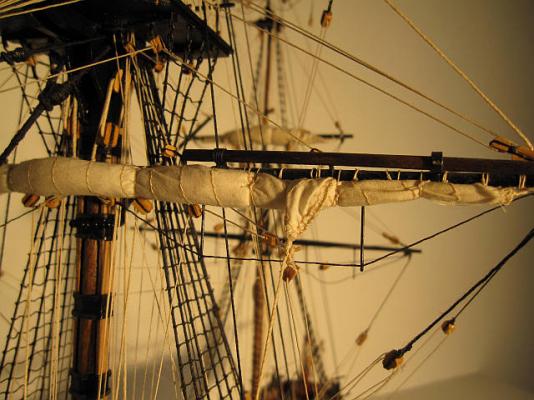
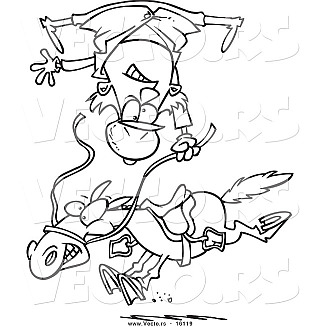
HMS Pegasus by flyer - FINISHED - Victory Models
in - Kit build logs for subjects built from 1751 - 1800
Posted · Edited by flyer
Presently I’m bending on the first sail, the mizzen topsail.
Sometimes I wish I was only a dumb officer, just having to order what has to be done. But being also an unskilled sail maker, carpenter, seaman etc. provides me with a lot of repetitive work where I find nobody to delegate to. Perhaps a hobby with fewer repetitions would be better. I wonder if I should try base jumping...
Bending on the sail with 2 robands per cloth
Setting the sail makers crew to work on it somehow achieved no progress